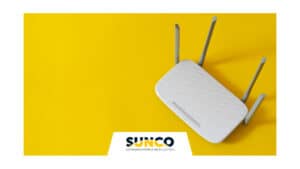In today’s digital landscape, choosing the right business phone system is crucial for maintaining effective communication and operational efficiency. With traditional PBX systems competing against modern VoIP solutions, businesses face important decisions about their communication infrastructure.
According to recent studies, 74% of businesses plan to switch to VoIP systems within the next three years. However, this doesn’t automatically mean VoIP is the right choice for every organization.
As Sean Schoenberger, President of Sunco Communication & Installation notes, “The choice between VoIP and PBX isn’t just about following trends—it’s about finding the right solution that aligns with your business needs, infrastructure, and long-term goals.”
In this article, we’ll explore the key differences between VoIP and PBX systems to help you make an informed decision for your business.
Understanding the Basics
What is VoIP?
VoIP (Voice over Internet Protocol) is a technology that converts voice calls into digital signals, allowing you to make calls using an internet connection rather than traditional phone lines. This modern approach to telephony enables businesses to integrate voice communications with other digital tools and services.
What is PBX?
PBX (Private Branch Exchange) is a private telephone network used within organizations. Traditional PBX systems use dedicated copper wiring and physical hardware to manage calls, while modern IP-PBX systems can incorporate some internet-based features while maintaining traditional infrastructure.
Key Differences Between VoIP and PBX
1. Technology and Infrastructure
VoIP Systems:
- Operate entirely over the internet
- Require minimal physical hardware
- Can be cloud-based or on-premises
- Need stable internet connection
PBX Systems:
- Use dedicated telephone lines
- Require significant physical infrastructure
- Primarily on-premises installation
- Independent of internet connectivity
2. Cost Comparison
The financial impact of your phone system choice can be significant. Research shows that businesses can [save up to 50% on communication costs](https://www.avoxi.com/blog/sip-trunking-benefits-advantages/) by switching to internet-based phone systems.
VoIP Costs:
- Lower initial investment
- Reduced maintenance expenses
- Pay-as-you-go pricing options
- Minimal hardware costs
PBX Costs:
- Higher upfront investment
- Regular maintenance requirements
- Fixed capacity costs
- Hardware replacement expenses
3. Features and Functionality
VoIP Features:
- Advanced call routing
- Video conferencing
- Integration with business applications
- Mobile device compatibility
- Real-time analytics
PBX Features:
- Traditional call handling
- Basic call routing
- Limited integration capabilities
- Physical phone dependence
- Standard call features
4. Scalability and Flexibility
VoIP Scalability:
- Easy to add/remove users
- Quick deployment of new features
- Remote work capabilities
- Location-independent service
PBX Scalability:
- Hardware-dependent growth
- Physical installation required
- Location-specific setup
- Limited remote capabilities
Choosing the Right System for Your Business
When selecting between VoIP and PBX, consider these key factors:
- Budget Considerations
- Initial investment capacity
- Long-term operational costs
- Growth projections
- Technical Requirements
- Internet infrastructure
- Current phone system
- Integration needs
- Business Operations
- Remote work needs
- Call volume
- Feature requirements
- Growth Plans
- Expansion timeline
- Scalability needs
- Future technology adoption
- Support Requirements
- IT resources
- Maintenance capabilities
- Training needs
Making Your Decision
The choice between VoIP and PBX ultimately depends on your specific business needs. VoIP might be ideal if you:
- Need advanced features and integrations
- Have a reliable internet connection
- Want lower upfront costs
- Require remote work capabilities
PBX might be better if you:
- Require guaranteed call quality
- Have limited internet infrastructure
- Need maximum security
- Prefer traditional telephony
Partner with Sunco for Your Business Communication Needs
Whether you choose VoIP or PBX, having the right partner for implementation and support is crucial. Sunco Communication & Installation offers expert guidance and support for both VoIP and PBX solutions, ensuring you get the most from your investment.
Contact us today to discuss your business communication needs and discover which phone system is right for you.




